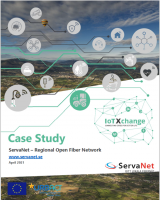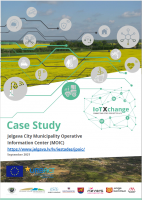
“Experience is the best teacher” – learning through Case Studies about methods to use technology and innovative business models to improve Urban Development in small cities
By Eurico Neves, Lead Expert of the ‘IoTXchange’ URBACT APN project, CEO of INOVA+ S.A.
It is commonly accepted that ‘Experience is the best teacher ‘. However, this experience doesn’t have to be undergone personally, and can be learnt through the lessons and achievements of others as well. That’s the whole purpose of Case Studies, and that’s how they have been used within the context of the IoTXchange Action Planning Network (APN) of the URBACT programme.
Small and median cities, as those that make up the IoTXChange APN, face big challenges when adopting new technologies. Issues like economies of scale, negotiation power, and widespread rural areas that need to be serve mean that setting up technological infrastructure services is often more complex – and more expensive – in small cities that in big ones.
The IoTXchange APN, like all URBACT networks, exists to make that process a little simpler through the exchange of practical know-how and inspiration between cities around a common theme, in this case the ‘smartisation’ of small cities through Internet of Things (IoT) technologies and infrastructure. Mutual learning and knowledge flow are key in URBACT and learning from what the others have done best is the way to do it right!
It was with this in mind 
The first Case Study is a great example of how small municipalities can pool resources and promote intermunicipal service providers, with innovative business models, that can help to surpass the market failure in terms of service provision, due to low rentability or higher investment costs. The complete case study is available online at: https://public.3.basecamp.com/p/BhVSgmJc8kwTMF83VHUQ9KmT
The second Case Study, on its turn, is a high tech example of a control facility that gathers a lot 
In order to develop the Case Studies, working days of an Ad-Hoc Expert made available by the URBACT programme, have been used, respecting the principle of using programme expertise for tasks that are beneficial to the whole network. The original plan (draw in pre-COVID days) foresaw that Case Studies would be developed prior to the Transnational Network Meetings held in Ånge and Jelgava, respectively, allowing to combine the presentation of the Case Studies with study visits to the original sites and face-to-face discussions with the local promoters. That of course was not to be for the reasons we all know, but we managed to stay pretty close to the script, nevertheless. While both meetings have been held on online format during the current year of 2021, in late April in the case of Ånge and mid-September for Jelgava, the case presentation and open discussions moderated by the Ad-Hoc Expert and case promoters still took place, and even a ‘virtual study visit’ to the Jelgava MOIC that you can find here: https://public.3.basecamp.com/p/MScY5eeGDXfdn6D2x2Eci6ba
Taking new approaches towards the digitalization of cities can be hard, risky and costly – often all the three at the same time. Before planning new actions is always better to learn from the lessons of others that have started the path earlier. Especially during the COVID pandemic context, where on-site visits and face-to-face exchanges, so common within the URBACT network, were impossible, Case Studies have proven to be a very useful too for knowledge sharing, that we are glad to have developed within IoTXchange and happily share with other networks and urban practitioners.

